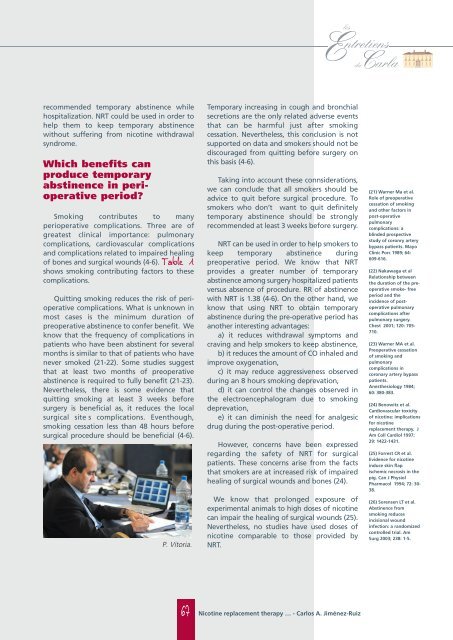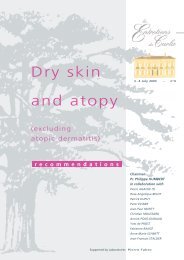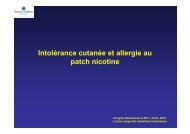Nicotine replacement therapy … - Carlos A ... - Entretiens du Carla
Nicotine replacement therapy … - Carlos A ... - Entretiens du Carla
Nicotine replacement therapy … - Carlos A ... - Entretiens du Carla
You also want an ePaper? Increase the reach of your titles
YUMPU automatically turns print PDFs into web optimized ePapers that Google loves.
ecommended temporary abstinence while<br />
hospitalization. NRT could be used in order to<br />
help them to keep temporary abstinence<br />
without suffering from nicotine withdrawal<br />
syndrome.<br />
Which benefits can<br />
pro<strong>du</strong>ce temporary<br />
abstinence in perioperative<br />
period?<br />
Smoking contributes to many<br />
perioperative complications. Three are of<br />
greatest clinical importance: pulmonary<br />
complications, cardiovascular complications<br />
and complications related to impaired healing<br />
of bones and surgical wounds (4-6). Table 1<br />
shows smoking contributing factors to these<br />
complications.<br />
Quitting smoking re<strong>du</strong>ces the risk of perioperative<br />
complications. What is unknown in<br />
most cases is the minimum <strong>du</strong>ration of<br />
preoperative abstinence to confer benefit. We<br />
know that the frequency of complications in<br />
patients who have been abstinent for several<br />
months is similar to that of patients who have<br />
never smoked (21-22). Some studies suggest<br />
that at least two months of preoperative<br />
abstinence is required to fully benefit (21-23).<br />
Nevertheless, there is some evidence that<br />
quitting smoking at least 3 weeks before<br />
surgery is beneficial as, it re<strong>du</strong>ces the local<br />
surgical site s complications. Eventhough,<br />
smoking cessation less than 48 hours before<br />
surgical proce<strong>du</strong>re should be beneficial (4-6).<br />
P. Vitoria.<br />
Temporary increasing in cough and bronchial<br />
secretions are the only related adverse events<br />
that can be harmful just after smoking<br />
cessation. Nevertheless, this conclusion is not<br />
supported on data and smokers should not be<br />
discouraged from quitting before surgery on<br />
this basis (4-6).<br />
Taking into account these connsiderations,<br />
we can conclude that all smokers should be<br />
advice to quit before surgical proce<strong>du</strong>re. To<br />
smokers who don’t want to quit definitely<br />
temporary abstinence should be strongly<br />
recommended at least 3 weeks before surgery.<br />
NRT can be used in order to help smokers to<br />
keep temporary abstinence <strong>du</strong>ring<br />
preoperative period. We know that NRT<br />
provides a greater number of temporary<br />
abstinence among surgery hospitalized patients<br />
versus absence of proce<strong>du</strong>re. RR of abstinence<br />
with NRT is 1.38 (4-6). On the other hand, we<br />
know that using NRT to obtain temporary<br />
abstinence <strong>du</strong>ring the pre-operative period has<br />
another interesting advantages:<br />
a) it re<strong>du</strong>ces withdrawal symptoms and<br />
craving and help smokers to keep abstinence,<br />
b) it re<strong>du</strong>ces the amount of CO inhaled and<br />
improve oxygenation,<br />
c) it may re<strong>du</strong>ce aggressiveness observed<br />
<strong>du</strong>ring an 8 hours smoking deprevation,<br />
d) it can control the changes observed in<br />
the electroencephalogram <strong>du</strong>e to smoking<br />
deprevation,<br />
e) it can diminish the need for analgesic<br />
drug <strong>du</strong>ring the post-operative period.<br />
However, concerns have been expressed<br />
regarding the safety of NRT for surgical<br />
patients. These concerns arise from the facts<br />
that smokers are at increased risk of impaired<br />
healing of surgical wounds and bones (24).<br />
We know that prolonged exposure of<br />
experimental animals to high doses of nicotine<br />
can impair the healing of surgical wounds (25).<br />
Nevertheless, no studies have used doses of<br />
nicotine comparable to those provided by<br />
NRT.<br />
67 <strong>Nicotine</strong> <strong>replacement</strong> <strong>therapy</strong> … - <strong>Carlos</strong> A. Jiménez-Ruiz<br />
(21) Warner Ma et al.<br />
Role of preoperative<br />
cessation of smoking<br />
and other factors in<br />
post-operative<br />
pulmonary<br />
complications: a<br />
blinded prospective<br />
study of coronry artery<br />
bypass patients. Mayo<br />
Clinic Porc 1989; 64:<br />
609-616.<br />
(22) Nakawaga et al<br />
Relationship between<br />
the <strong>du</strong>ration of the preoperative<br />
smoke- free<br />
period and the<br />
incidence of postoperative<br />
pulmonary<br />
complications after<br />
pulmonary surgery.<br />
Chest 2001; 120: 705-<br />
710.<br />
(23) Warner MA et al.<br />
Preoperative cessation<br />
of smoking and<br />
pulmonary<br />
complications in<br />
coronary artery bypass<br />
patients.<br />
Anesthesiology 1984;<br />
60: 380-383.<br />
(24) Benowitz et al.<br />
Cardiovascular toxicity<br />
of nicotine: implications<br />
for nicotine<br />
<strong>replacement</strong> <strong>therapy</strong>. J<br />
Am Coll Cardiol 1997;<br />
29: 1422-1431.<br />
(25) Forrest CR et al.<br />
Evidence for nicotine<br />
in<strong>du</strong>ce skin flap<br />
ischemic necrosis in the<br />
pig. Can J Physiol<br />
Pharmacol 1994; 72: 30-<br />
38.<br />
(26) Sorensen LT et al.<br />
Abstinence from<br />
smoking re<strong>du</strong>ces<br />
incisional wound<br />
infection: a randomized<br />
controlled trial. Am<br />
Surg 2003; 238: 1-5.






